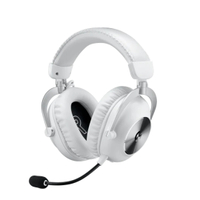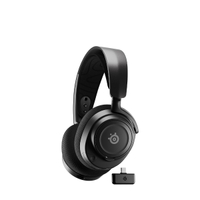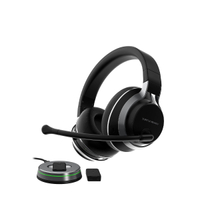With solid performance, comfortable cushions, and a truly impressive battery life, the ROG Delta II checks off all the basic boxes of a stellar gaming headset. However, given the price tag, lackluster microphone, and absence of what some may consider vital features, the Delta II is perfect for some while wanting for others.
Pros
- +
3D audio couldn’t be more accurate
- +
Comfortable cushions and headband
- +
Impressive battery with fast charging
Cons
- –
Price tag stings a little
- –
Microphone quality could be better
- –
May be too feature-light for some
Why you can trust TechRadar We spend hours testing every product or service we review, so you can be sure you’re buying the best. Find out more about how we test.
Asus ROG Delta II: two-minute review
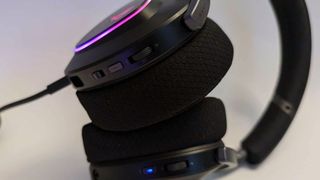
The ROG Delta II wireless headset is the latest in the Asus Republic of Gamers line of audio peripherals for gaming. The set maximizes comfort without diminishing audio quality in a lightweight, over-ear headset that’s clearly made for all aspects of gaming. While gaming peripherals from companies like ROG or Razer can feel gimmicky for streamers or, at the very least, don’t stand up to higher-end, general-purpose counterparts, the Delta II is surprisingly versatile and even excels beyond something like the costlier Audeze Maxwell. With so many different headsets on the market, ROG had to find a way to separate the Delta II from the crowd, and despite its general simplicity, it succeeded in most ways.
The biggest surprise is the comfort level. The lightweight design, forgiving band, and plush mesh or PU leather ear cushions minimize the occurrence of headaches. Even with a looser band, the earcup creates a seal that cuts down on external noise despite no active noise cancelation.
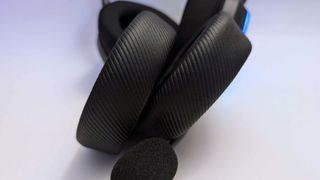
While on the higher end of the price spectrum when compared to other Delta models, the Delta II’s $229 / £219 / AUS$368 price tag stings less when you start noticing audio cues that may have been otherwise drowned out through TV speakers or a lower quality headset. The plug-and-play compatibility with the PS5 (via USB-C dongle) and Xbox Series X/S (via 3.5mm cord) are vitally convenient and provide the best gaming experience, whereas use via PC (Bluetooth or USB-C) can be tweaked and customized using the Armoury Crate software.
Asus ROG Delta II: Price and availability
- When is it available? Available now
- How much does it cost? $229 / £219 / AUS$368
- Where can you get it? Available in the US, UK, and AUS
The ROG Delta II officially launched on September 12, 2024, at a price point of $229 / £219 / AUS$368. Though fairly high, especially for a gaming headset, the Delta II justifies the cost with a build that makes the Delta S and its 50mm Asus essence drivers obsolete. Titanium is where it’s at for a fuller audio experience that elevates game audio design to ensure even the most subtle cues aren’t missed.
There’s a market for the ROG Delta II; it just may not be the casual player who picks up a controller every few weeks. Someone willing to drop $229 on a wireless headset when there are options for more than half the price will better appreciate the enhanced audio provided by the 50mm titanium drivers. Though the headset does work quite nicely for PC, it almost feels like a console-specific accessory, especially since connecting any headset to an Xbox or PS5 isn’t as simple as establishing a Bluetooth connection, and compatibility isn’t guaranteed.
What really justifies the price is how well the headset handles the PS5’s spatial audio to suck players in. With that being said, that’s only good for PS5 players, leaving Xbox gamers to once again deal with the antiquated 3.5mm audio plug. That’s when it gets difficult to recommend a $200-plus headset because while the drivers work wonders, I can’t help but wonder if the much cheaper, 3.5mm-compatible Delta Core could get the job done for very casual players.
- Value: 3.5 / 5
Asus ROG Delta II: Specs
Swipe to scroll horizontally
| Type: | Wireless over-ear |
| Drivers: | 50mm Titanium-plated diaphragm |
| Weight: | 11.2oz (318g) |
| Connectivity: | Bluetooth, 2.4Ghz with ROG SpeedNova, 3.5mm |
| Sensitivity: | -40dB |
| Impedance: | 32ohm |
| Frequency range: | 20Hz – 20KHz |
| Frequency response: | 100Hz – 10KHz |
Asus ROG Delta II: Features
- DualFlow Audio for simultaneous device use
- Tri-Mode connectivity with ROG SpeedNova
- Few features lend to a user-friendly experience
ROG didn’t go too heavy on features for the Delta II, which is a double-edged sword. On one hand, it allows the headset’s base audio quality to shine without forcing you to navigate a sea of button presses and app integrations. The Delta II caters to a plug-and-play crowd, especially for consoles. It also supports the notion that this headset isn’t meant for audiophiles, and even casual players can get the most out of the titanium drivers without fuss.
Then again, an older competitor like Razer’s Kaira Pro (2022), which retails for only $30 less (for the PS5 model), is brimming with different audio-enhancing features. Along with haptic feedback, the Kaira Pro includes a toggle that swaps between improved bass, amplified audio, and a gaming profile for a more diverse user experience. You may be wondering why you’d spend more for what seems like less, but the Delta II’s success is that it hones in on a well-rounded build to render all of those enhancements unnecessary.
Of course, you can still control your sound design on a PC. The Delta II connects with ROG’s Armoury Crate software to optimize sound with toggles for an equalizer, reverb, and virtual surround sound along with slides for bass boost and compression. You can also choose between preset profiles for movies, music, gaming, and communicating, which change the necessary settings to adjust sound for each application.
One of the Delta II’s more interesting features is DualFlow Audio. Using both the 2.4 GHz wireless and Bluetooth, it feeds audio from two devices simultaneously. That may sound like chaos, but it’s a great way to game on a PS5 and still be able to use Discord (or TeamSpeak, if you’re still using it) or chat with viewers on the PC without a mixer or additional equipment. The input audio skipped infrequently, but the rare hiccup is worth dealing with for something so simple and useful.
None of this matters all that much if the headset is dead within hours of charging. Thankfully, ROG found a way to prolong the life of the Delta II to up to over 110 hours (using 2.4GHz wireless without RGB lighting). I tried to run the battery dry, but it’s quite resilient and looks like it does live up to at least a sizable portion of that 110 hours. ROG also boasts a quick charge, where you can squeeze 11 hours of use time after only 15 minutes on the included USB-C charger.
- Features: 4 / 5
Asus ROG Delta II: Sound quality
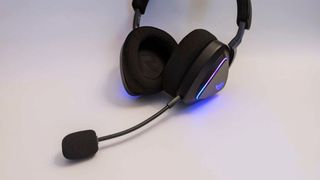
- Full-bodied audio that struggles with deeper bass
- Binaural audio is immersive and crystal clear
- Detachable microphone could use some work
After running a simple online bass test, I realized there were a few hiccups in the Delta II’s sound quality. While that should be a negative mark, it really indicated that the headset was specifically designed for gaming, especially since the worst offense was vibrating drivers at a low frequency I wouldn’t expect to hear in a video game. Some music with deeper bass may cause the drivers to vibrate, but the Delta II isn’t really made for music. Sure, you can connect to your iPhone and blast your favorite tunes, but ROG cares more about making sure you feel like you’re in the middle of Liberty City. Across most of the games I tested the Delta II with, I discovered the immersion I was missing by using TV speakers.
My favorite experience with the Delta II was Returnal. Having heard the game through the TV and the Audeze Maxwell, I was not prepared for how different it would sound with the titanium drivers. It engulfs you in the alien world in a way video games should, with every bit of audio, big or small, sounding like they were in the room with me. Even Marvel’s Spider-Man 2 sounded better, to the point where I could hear the faint flapping of Spidey’s wings while gliding.
On PC, I toyed with Armoury Crate’s settings but pretty much always returned it to the preset gaming mode. It provided the fullest audio of the lot, making games like Dead Space 2 infinitely more horrifying.
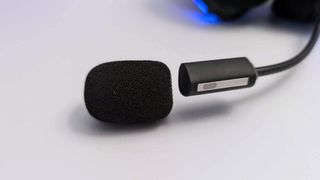
Playing on PC also highlighted Delta II’s weakest feature: its microphone. Though clear (and made clearer with Armoury Crate’s noise reduction setting) it had a tendency to stutter. It did seem to run fine on the PS5, though, and teammates could hear me clearly each round of Killer Klowns from Outer Space.
- Sound quality: 4.5 / 5
ASUS ROG Delta II: Design
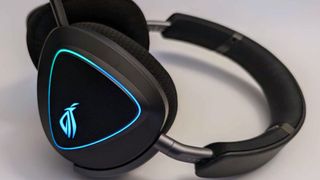
- Interchangeable plush ear cushions
- Flexible but durable headband
- Flimsy microphone design
There’s little to complain about with the Delta II’s design. Both ear cushions are very cozy and create a good seal to minimize external noise without pressing too hard against my head. The fabric and PU leather cushions were equally as soft, though I did sweat slightly with the latter.
Adding to the overall comfort is the headband. I’m used to headsets that squeeze and feel tight around my head, but the Delta II’s band doesn’t share that aggression. It does feel a little cheap, with very minimal padding at the top of the head, but it was comfortable enough to wear for several hours at a time without discomfort.
ROG kept things very simple with its button layout. The left earcup features controls for the volume and 2.4GHz dongle. Opposite that are the controls for Bluetooth connectivity and volume. Function buttons on both sides can control music based on how many times they’re pressed, making for a very user-friendly design.
- Design: 4 / 5
Should you buy the Asus ROG Delta II?
Swipe to scroll horizontally
| Attributes | Notes | Rating |
|---|---|---|
| Features | DualFlow Audio, Tri-Mode Connectivity, feature light for user-friendly functionality | 4 / 5 |
| Sound quality | Full-bodied, struggles with very deep bass, immersive 3D audio, detachable mic | 4.5 / 5 |
| Design | Comfortable ear cushions, simple button layout, lower-quality mic arm | 4 / 5 |
| Value | High-quality audio for a price, best of the ROG wireless line | 3.5 / 5 |
| Average Rating | A comfortable, clear-sounding gaming headset with a considerable price tag and as few faults as extra features | 4 / 5 |
Buy them if…
A lower-quality, cheaper headset or TV speakers don’t do the PS5’s spatial audio any justice. ROG’s Delta II, on the other hand, thrusts you into the action with titanium drivers and a stable wireless connection that’s smooth and crystal clear.
Both included ear cushions and the band design come together for a surprisingly comfortable wear. Though the band is nothing to write home about, it’s not tight and won’t squeeze even larger heads. The Delta II’s comfort also doesn’t hinder its ability to keep outside noises from polluting the audio, as the plush cushions create a strong, albeit cozy, seal.
